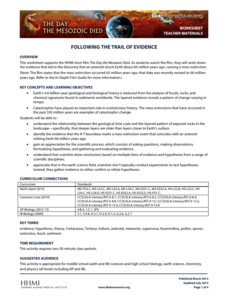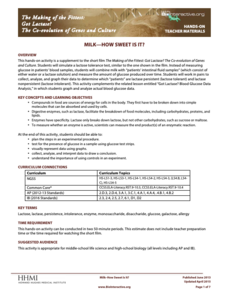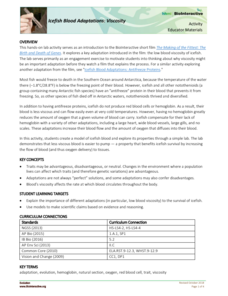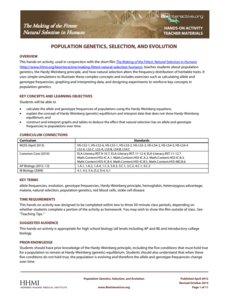Howard Hughes Medical Institute
West Nile Virus: Vectors and Hosts Game
The spread of an infectious disease can be a complicated process. Using a game approach, learners reenact the spread of the West Nile virus. They learn the need for the vector in transmitting the disease and how different organisms react...
Howard Hughes Medical Institute
Cancer Discovery Activities
Explore the genetic component of the second-leading cause of death in the world using a hands-on activity. After watching a video discussing the basics of cancer, learners complete activities that study the genes involved in cancer. The...
Howard Hughes Medical Institute
Mapping Genes to Traits in Dogs Using SNPs
Genetic analysis has gone to the dogs! Learners use real DNA information collected from dog saliva to study the relationship between genotypes and phenotypes. They analyze alleles to determine correlations to coat color, length, and...
Howard Hughes Medical Institute
Following the Trail of Evidence
One important skill in analyzing scientific evidence is identifying facts versus opinions. Scholars identify pieces of evidence from the film The Day the Mesozoic Died and then discuss this evidence in small groups at the end of each act...
Howard Hughes Medical Institute
Pedigrees and the Inheritance of Lactose Intolerance
What, exactly, causes lactose intolerance? Scholars view a video describing a Finnish study that determined why some people are tolerant while others are intolerant. They then use the data from the study to reenact the experiment and...
Howard Hughes Medical Institute
Milk—How Sweet Is It?
Have you ever wondered why some people are lactose intolerant? Participants test simulated patients in a hands-on lab activity to find out! They learn about lactose intolerance by performing an experiment, analyzing data, and drawing...
Howard Hughes Medical Institute
Testing a Hypothesis
Are sickle cell disease and malaria related somehow? Scholars learn about both illnesses and the hypotheses that they are related. They discuss, view a video, and answer questions to demonstrate understanding. The resource includes an...
Howard Hughes Medical Institute
Color Variation Over Time in Rock Pocket Mouse Populations
While many mutations are neutral, those that appear advantageous increase in frequency in a population. Scholars use illustrations to make predictions about populations of mice. They follow it up with a video to confirm or refute their...
Howard Hughes Medical Institute
Molecular Genetics of Color Mutations in Rock Pocket Mice
Can you identify mutations just by viewing DNA sequences? Scholars apply prior knowledge of DNA sequences to do just that in an engaging activity. They transcribe and translate genes, thus identifying the locations of mutations. Then,...
Howard Hughes Medical Institute
Biochemistry and Cell Signaling Pathway of the Mc1r Gene
How do mice have so much fur color variation over generations? Scholars illustrate protein structures based on amino acid sequences. Then, they analyze the signaling pathway in different-colored mice populations. This allows them to...
Howard Hughes Medical Institute
Natural Selection and Evolution of Rock Pocket Mouse Populations
Can evolution repeat itself? Scholars analyze amino acid data in two separate populations of mice. They learn that evolution repeats itself, but natural selection prefers some mutations over others in different environments. Analysis...
Howard Hughes Medical Institute
The Molecular Evolution of Gene Birth and Death
More than 90 percent of humans' DNA doesn't code for anything! Scholars watch a presentation as they answer questions relating to gene mutations. They read details, watch videos, and view animations supporting the concepts. The questions...
Howard Hughes Medical Institute
Icefish Blood Adaptations: Viscosity
Most fish freeze to death when the water is too cold, yet some fish live in the Southern Ocean where the water is often below freezing. Scholars use two models representing the blood from most fish versus the blood from Antarctic fish....
Howard Hughes Medical Institute
How Do Fibers Form?
The proteins inside a cell determine the shape of the cell. While most red blood cells have a circular shape, those with sickle cell take the shape of a sickle. This change in shape causes multiple issues in the system. Scholars solve...
Howard Hughes Medical Institute
Population Genetics, Selection, and Evolution
The Hardy-Weinberg principle states that alleles and genotypes remain constant in the absence of evolutionary influences. Scholars complete a simple hands-on activity applying the Hardy-Weinberg principle to sample data. They observe how...
Howard Hughes Medical Institute
Weighing the Evidence for a Mass Extinction Part 2: On Land
What can fossils tell us about periods of extinction? Young scholars interpret fossil layers to make conclusions about changes in life during different geological time periods. They analyze the fossils for abundance and diversity as well...
Howard Hughes Medical Institute
Classroom Activities: Stem Cells and Diabetes
How close are we to a cure for diabetes? It seems the cure which has a connection to stem cell research is a possibility! Learners explore the concept of stem cells with an engaging hands-on activity. A PowerPoint presentation provides...
Howard Hughes Medical Institute
The Mosquito Life Cycle Activity
Understanding the life cycle of a mosquito helps us understand how to prevent the spread of diseases they carry. A lab investigation provides learners with the opportunity to track the two-week life cycle of the mosquito. Scholars make...
Howard Hughes Medical Institute
Coral Reefs in Hot Water
Global warming is leaving coral reefs in hot water. What does that mean for their survival? Find out as scholars use authentic satellite data to explore the issue. Learners look for global trends in the data and research the effects the...
Howard Hughes Medical Institute
Battling Vector-Borne Diseases: Factors That Affect the Mosquito Life Cycle
Slow the spread of disease by slowing disease carriers in their tracks. Learners explore just how they might accomplish this as they experiment with the life cycle of a mosquito under different conditions. Scholars design and conduct...
Howard Hughes Medical Institute
Biodiversity and Evolutionary Trees
Compare what shells look like on the outside with what makes that happen on the inside. Scholars begin by sorting an various seashells by their physical characteristics into phylogenetic trees. They then conduct a DNA comparison of...
Howard Hughes Medical Institute
Classroom Activities: Mirror-Tracing Activity
What does it take to train your brain? Learners explore the question as they experiment with their own memory and motor skills. They attempt to trace an object using a mirror and then score their results over several trials. They then...
Howard Hughes Medical Institute
Classroom Activities: Planaria Regeneration Activity
Observe a flatworm as it regenerates its own head. A laboratory exploration asks learners to cut a planaria worm at different locations and then observe it regenerate. Using data collected during the exploration, they make conclusions...
Howard Hughes Medical Institute
Classroom Activities: Pedigree Analysis Activity
Trace a genetic trait through an entire pedigree. A class activity provides pupils with an opportunity to explore a pedigree tree displaying a specific trait. They draw conclusions from the display and provide recommendations based on...

























